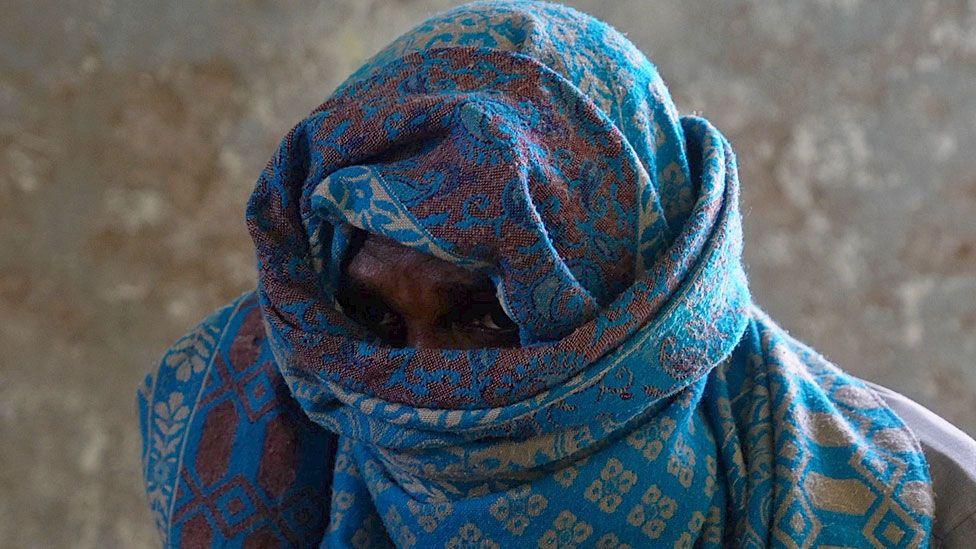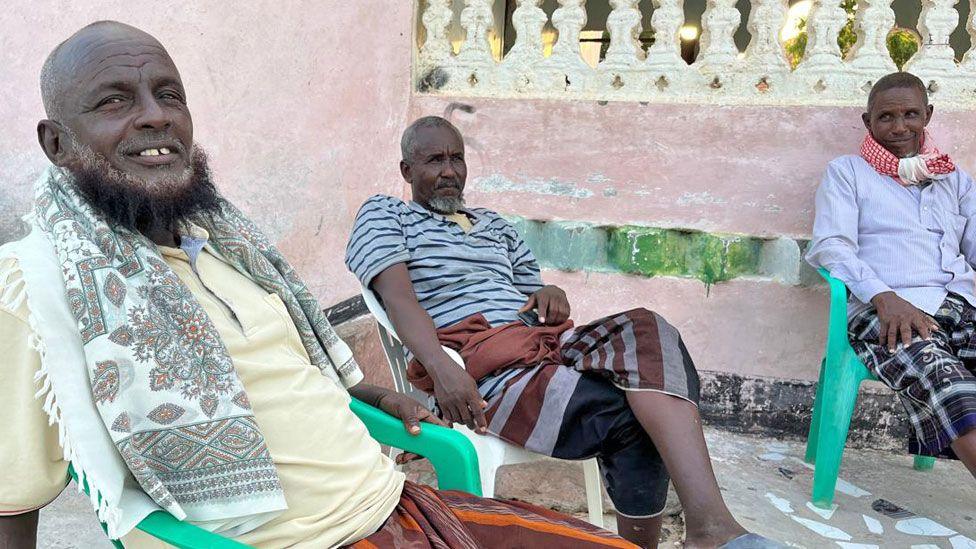Somali piracy 2.0 - the BBC meets the new robbers of the high seas

- Published
Two Somali fishermen wearing big scarves over their heads to hide their faces glance around furtively as they walk into the room for a secret meeting to tell me why they have recently decided to become gun-wielding pirates - in search of million-dollar ransoms.
"You are free to record - we accept," one tells me as they sit down nervously for the interview that has taken months to set up in the small coastal town of Eyl.
This behaviour is in stark contrast to the bravado of the pirates who used to strut around this charming, ancient port nestled between arid mountains on Somalia’s Indian Ocean coast.
It has always been considered strategic, not only because of its location but also because it has a fresh-water source - and during the piracy boom of the early to mid-2000s the pirates made it their base.
It became known as "Harunta Burcadda" - the Pirate Capital. From here, they targeted the container ships that transport goods around the world and even some oil tankers, forcing shipping companies to change their routes.
The regional authorities held no sway - and the local police force was too scared to enter the town.
Pirates kept their hijacked ships anchored offshore and businesses in the town and region profited from ransom payments. Between 2005 and 2012 the World Bank estimates pirate groups earned between $339m (£267m) and $413m.
But the pirates suffered a reversal of fortunes when international navies began to patrol the seas off Somalia and these days the Puntland Maritime Police Force has a base in Eyl.
Most people in the town welcomed this as the pirates brought with them eye-watering inflation, drugs, alcohol and a notoriety that the local Muslim elders shunned.
But the longstanding resentment felt towards foreign shipping, in particular fishing trawlers, has never gone away in a town full of fishermen that depends on the sea for its survival. To this day they accuse these fishing boats of stealing their living - often violently.
"Ships came and took all our equipment and belongings," Farah, one of the fisherman-turned-pirates looking out defensively from behind his blue scarf, tells the BBC.
Both his name and that of his friend Diiriye, who is wrapped in a white headscarf, have been changed - one of the conditions of our meeting.
He and a few others had invested approximately $10,000 in a fishing venture for a boat, outboard engine and nets. But Farah says last year the crew of one foreign trawler came and stole the nets, along with its catch, and then shot the engine - destroying it.
The pair give another example: some of their relatives had gone out to check their nets one morning and never came back - usually the fisherman go out at dawn and return before the midday heat hits.
Three days later they were found, floating towards the beach.
"There were bullets in their bodies," Diiriye says.
"They had no guns; they had gone to the sea with their nets to make their livelihood."

Officers from the Puntland Maritime Police Force are now based in Eyl
Farah goes on: "We work and live by the sea. The sea is our business.
"When someone intimidates you and robs you, it is compulsory to fight. They caused the fight. Had they not taken our property, we would not go to piracy."
These men - aged in their 30s - are not alone in making the decision over the last year to turn to piracy.
According to the European Union’s naval force Operation Atalanta, which patrols nearby, there were 26 pirate attacks between 2013 and 2019 - and then not a single one from 2020 to 2022. But they resumed in 2023, with six attacks and surged to 22 this year, figures until 5 December show.
Most of these skirmishes do not end up in a successful hijacking - but when it does, it pays. Pirates say they received a ransom of $5m to release the Bangladesh-flagged MV Abdullah, hijacked in March 2024. The vessel's owner has not confirmed this, but did say it was freed following negotiations.
Sources in the semi-autonomous Puntland state, where Eyl is located, told the BBC they estimate about 10 gangs, each with around 12 members, are operating in the area.
They go off to sea for 15 to 30 days at a time, packing their small speed-boats with AK-47s, rocket-propelled grenades (RPGs), food and fuel.
We use the RPG to stop the ship. When the ship doesn’t stop, we shoot over it. We don’t kill. The aim is to get something, not to kill"

Farah and Diiriye say their aim is to hijack a medium-sized vessel deep in the Indian Ocean and then make it back to their mother ship, using its GPS tracking system to find bigger ships to target.
"You can attack the ships using small speed boats," says Farah.
Their Bazooka rocket launcher is also an essential part of their strategy.
"We use the RPG to stop the ship. When the ship doesn’t stop, we shoot over it. We don’t kill. The aim is to get something, not to kill. [The aim is] to frighten them," says Diiriye.
All this weaponry does not come cheap - so the gangs essentially seek funding from interested investors. The disgruntled fishermen put out feelers and a syndicate is formed often involving different businessmen from the cities of Garowe and Bosaso.
One may fund the boats, another the weapons and a third sundries like fuel. These entrepreneurs sometimes invest in several groups in the hope that one of them will hit the jackpot when a vessel is captured so they can get their cut of the ransom.
And it is easy to get hold of a gun in Somalia - even in Eyl you can pick up an AK-47 for about $1,200, a legacy of its two-decade civil war and years of lawlessness.
Farah and Diiriye say they were not involved in the piracy boomtime and have not taken any advice from retired pirates, some of whom also started out as disgruntled fishermen.
Most of these old pirates have left the area - often they have gone abroad or have repented.
In one famous case a former pirate - Abdirahman Bakeyle - gave away his wealth. In 2020, he donated the houses and hotels he had bought in Garowe to Muslim charities and is now a travelling preacher going from town to town in Puntland urging people to lead an austere and morally upright life.
Adado, a town in central Somalia where pirates once invested, earned the nicknamed "Blue City" because their newly built mansions often had blue-painted iron sheet roofs.
A good deal of these houses now lie empty - or available to rent for as little as $100 a month.
In Eyl, the town elders say the main legacy of piracy is the prevalence of alcohol, often smuggled in from Ethiopia, and drugs such as opioids - with concerns that some young men who already chew the stimulant leaf khat, a popular afternoon pastime, are becoming addicts.
The men who gather outside teashops in the afternoons to play dominoes and discuss the news say they do not approve of piracy - although they understand the enmity towards foreign ships.
The recent incident of the three fishermen who were shot dead clearly rankles with many.
Ali Mursal Muse, who has been fishing for lobsters and sharks off Eyl for about 40 years to support his wife and 12 children, believes they may have been mistaken for pirates - as he was years ago.
"We left here with another fishing boat and went to the sea. At the same time pirates tried to hijack a ship. A plane came. My boat came to the shore; the other fishing boat was attacked," he recalls.

Hawa Mohamed Zubery believes her fisherman husband was mistaken for a pirate - he has been missing for 14 years
Forty-year-old widow Hawa Mohamed Zubery believes her husband suffered the same fate 14 years ago when he went missing.
This was when piracy was at its peak and she had just given birth to a son, whom they wanted to circumcise.
"My husband was thinking that if he caught a shark then we could pay to have the baby circumcised," she tells the BBC, clearly still distressed about his death. She says she struggles to pay school fees for her children from her living selling samosas.
Mr Muse says the main issue for him these days is the unethical behaviour of fishing fleets from countries like Iran and Yemen which often steal his equipment.
He believes they are issued with fake Somali fishing licences by powerful local backers who also provide them with gunmen for protection. He accused them of looting their catches and muscling in on their fishing grounds.
"They have a zone they work and they even come on the beach. When we go and ask for our equipment back, they shoot at us. Recently, they hurt some people. They shot a boy, wounding his hand and leg."
The fisherman says he has complained to the local authorities on multiple occasions, but nothing is ever done.
Puntland’s Information Minister Caydid Dirir admits the presence of some illegal vessels and says some foreign ships may be granted licences and "misuse them".
"Illegal fishing exists in all seas, and piracy can occur anywhere. Progress is being made gradually," he tells the BBC.
Illegal fishing has been a controversial issue in Somalia for many years.
Many fishing vessels operate without licences or with licences issued by bodies without the authority to do so, according to the Global Initiative against Transnational Organised Crime.
It quotes evidence, including satellite navigational data, to show that many of the vessels originate from China, Iran, Yemen and south-east Asia. A report from the US embassy in Mogadishu suggests Somalia loses $300m each year as a result.
Operation Atalanta’s Rear Admiral Manuel Alvargonzález Méndez says his forces only target pirate vessels and now also have to protect ships from Yemen’s Houthi rebels.
But he maintains the area is much safer and Somalis can now "cast their fishing nets without fear" - as does the Puntland Maritime Police Force, which works closely with the EU naval mission.

Elders in Eyl do not want to see the return of pirates
Its commander Farhan Awil Hashi is confident that it will not return to the "bad old days" of piracy.
He believes the long-term answer is "job creation".
"Young people must get jobs, always. If the person is busy doing something, they will not think about heading to the sea and hijacking ships," he tells the BBC.
Farah and Diiriye make the same argument - they say because fishing no longer pays, hijacking a ship for ransom is the only way they can support their children.
They know piracy is wrong - and Diiriye admits he is too scared to tell his own mother.
"If she knew, she would be very disappointed. In fact, she would inform the authorities."

You may also be interested in:

Go to BBCAfrica.com, external for more news from the African continent.
Follow us on Twitter @BBCAfrica, external, on Facebook at BBC Africa, external or on Instagram at bbcafrica, external